Christian Philosophy: Exploring Moral Arguments for God's Existence
VerifiedAdded on 2021/01/01
|8
|2603
|76
Essay
AI Summary
This essay delves into the realm of Christian philosophy, specifically examining moral arguments for the existence of God. It begins by introducing the concept of philosophy and its application to Christian beliefs, setting the stage for a discussion on various arguments. The essay explores key arguments such as Pascal's Wager, the ontological, cosmological, and teleological arguments, analyzing their strengths and weaknesses. A significant portion is dedicated to the moral argument, including an examination of the Euthyphro dilemma and the shortcomings of utilitarianism. The essay also touches upon arguments from moral knowledge and the views of philosophers like Richard Swinburne and Immanuel Kant. The conclusion acknowledges that while no single argument provides definitive proof, each offers valuable insights into the philosophical debate surrounding God's existence.
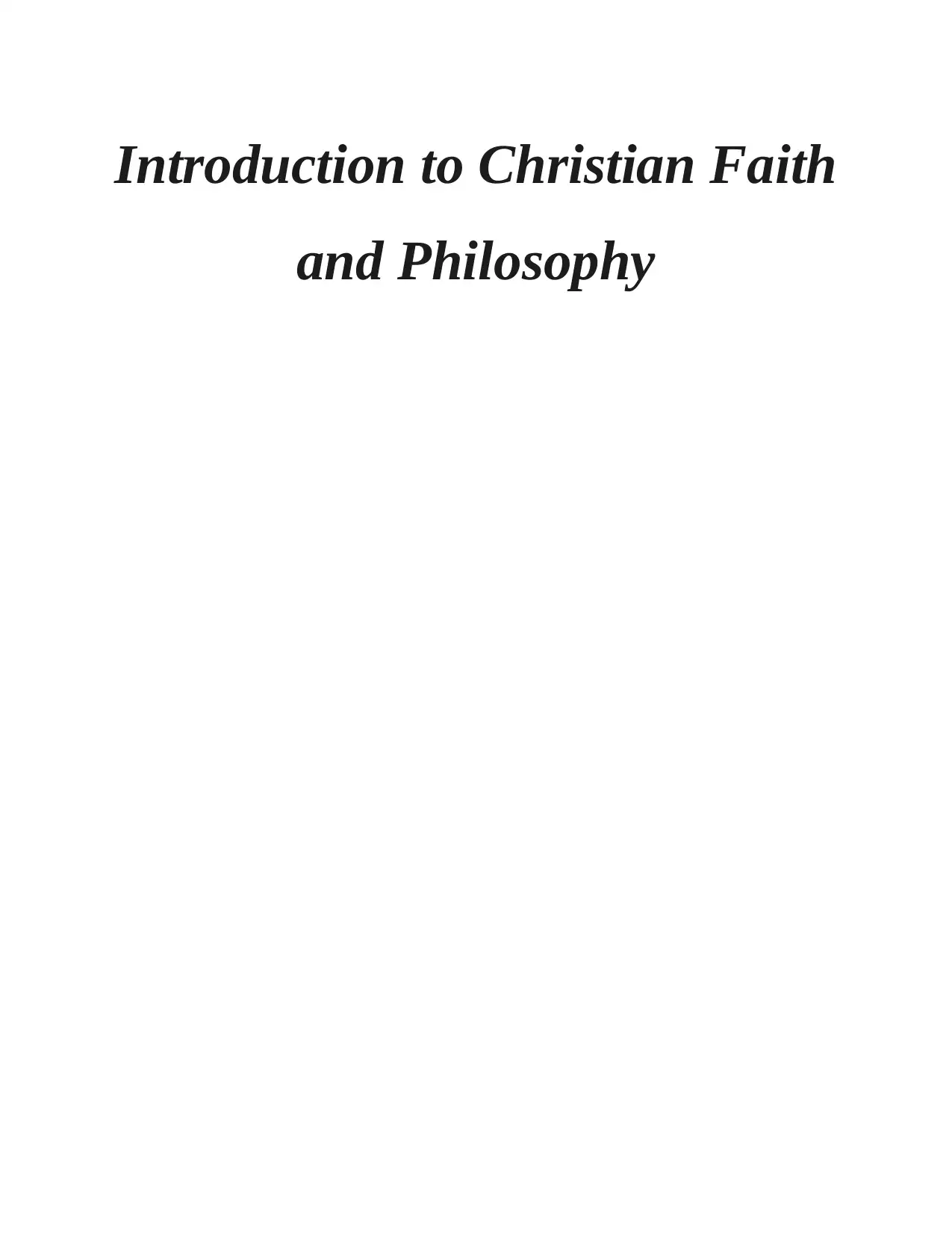
Introduction to Christian Faith
and Philosophy
and Philosophy
Paraphrase This Document
Need a fresh take? Get an instant paraphrase of this document with our AI Paraphraser
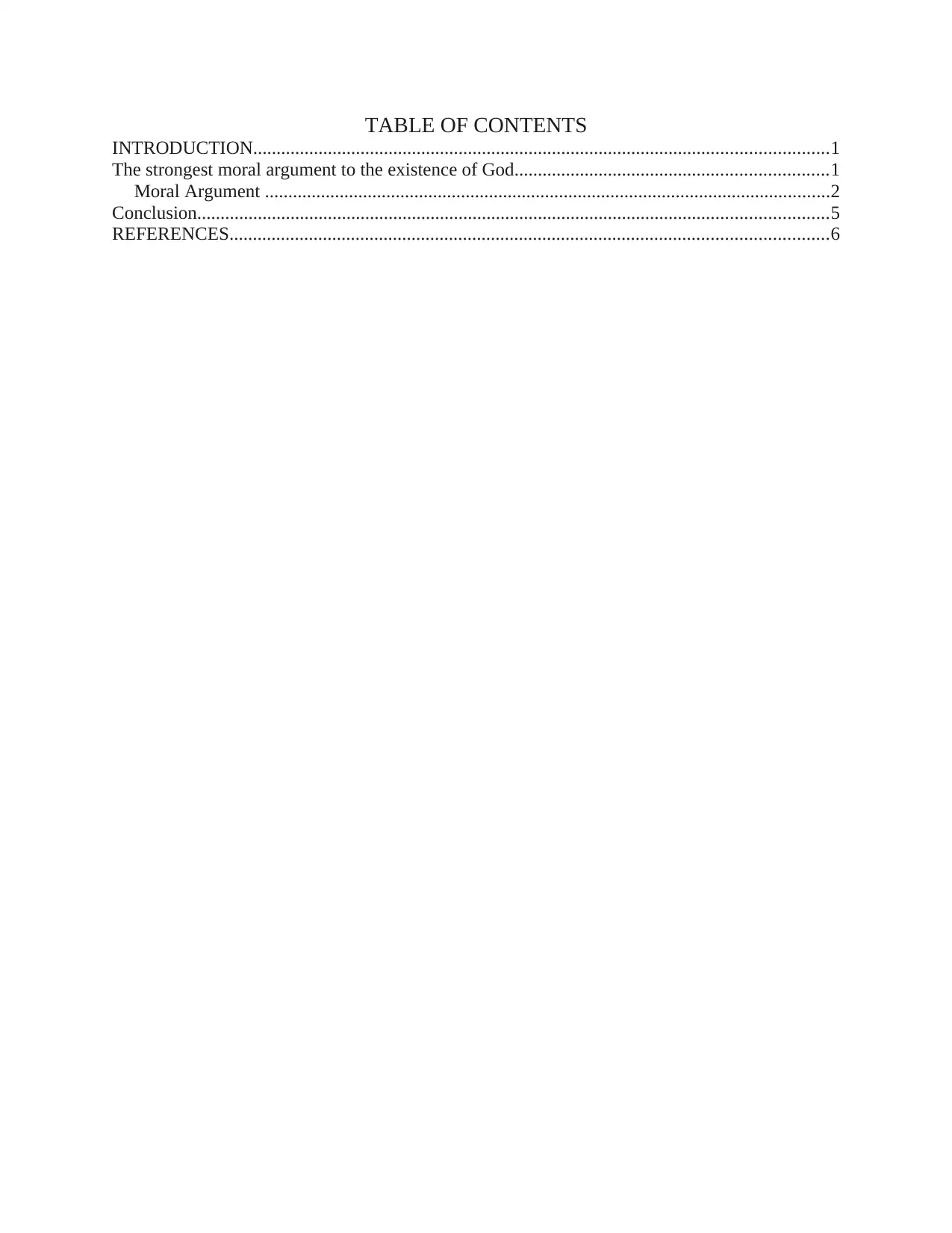
TABLE OF CONTENTS
INTRODUCTION...........................................................................................................................1
The strongest moral argument to the existence of God...................................................................1
Moral Argument .........................................................................................................................2
Conclusion.......................................................................................................................................5
REFERENCES................................................................................................................................6
INTRODUCTION...........................................................................................................................1
The strongest moral argument to the existence of God...................................................................1
Moral Argument .........................................................................................................................2
Conclusion.......................................................................................................................................5
REFERENCES................................................................................................................................6
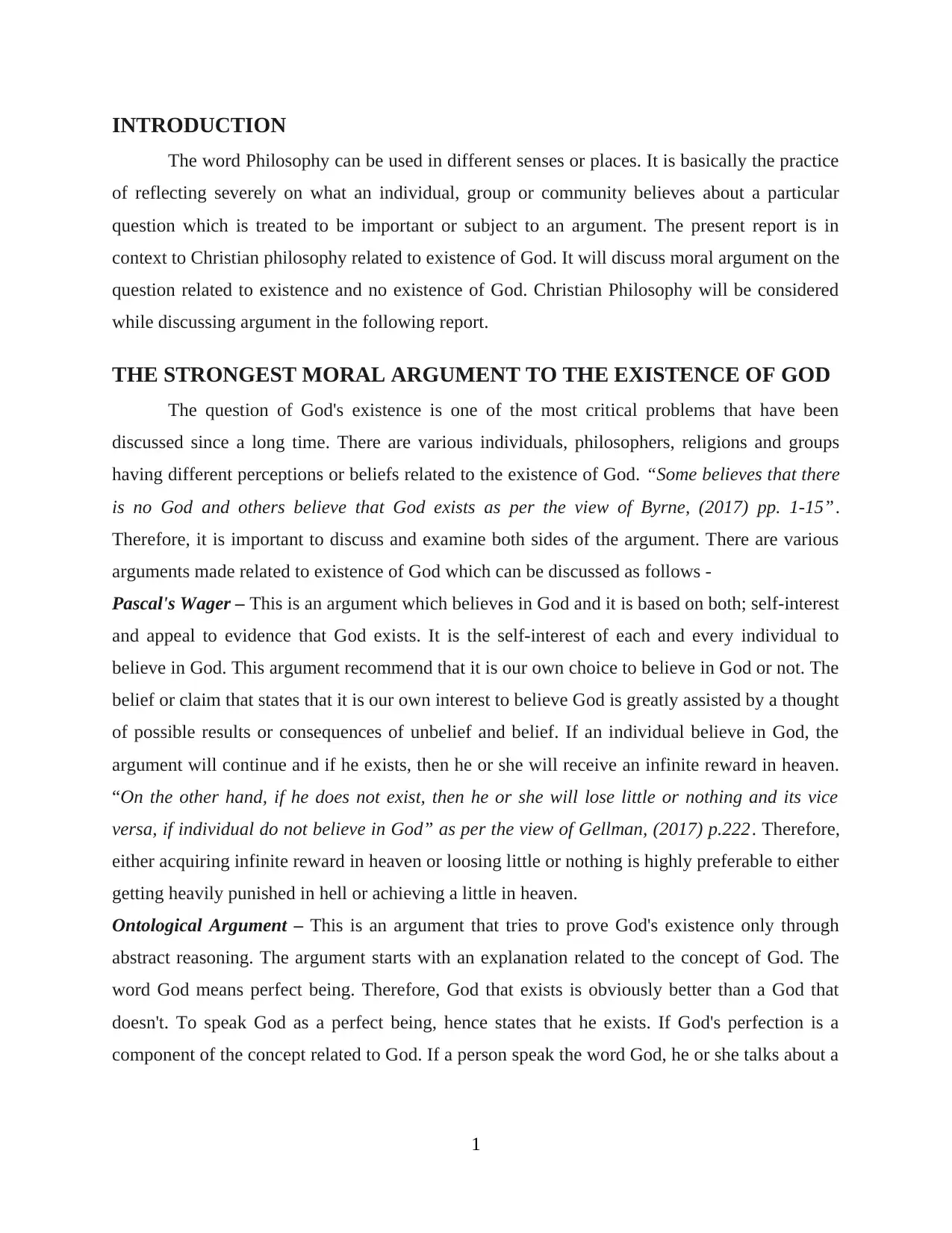
INTRODUCTION
The word Philosophy can be used in different senses or places. It is basically the practice
of reflecting severely on what an individual, group or community believes about a particular
question which is treated to be important or subject to an argument. The present report is in
context to Christian philosophy related to existence of God. It will discuss moral argument on the
question related to existence and no existence of God. Christian Philosophy will be considered
while discussing argument in the following report.
THE STRONGEST MORAL ARGUMENT TO THE EXISTENCE OF GOD
The question of God's existence is one of the most critical problems that have been
discussed since a long time. There are various individuals, philosophers, religions and groups
having different perceptions or beliefs related to the existence of God. “Some believes that there
is no God and others believe that God exists as per the view of Byrne, (2017) pp. 1-15”.
Therefore, it is important to discuss and examine both sides of the argument. There are various
arguments made related to existence of God which can be discussed as follows -
Pascal's Wager – This is an argument which believes in God and it is based on both; self-interest
and appeal to evidence that God exists. It is the self-interest of each and every individual to
believe in God. This argument recommend that it is our own choice to believe in God or not. The
belief or claim that states that it is our own interest to believe God is greatly assisted by a thought
of possible results or consequences of unbelief and belief. If an individual believe in God, the
argument will continue and if he exists, then he or she will receive an infinite reward in heaven.
“On the other hand, if he does not exist, then he or she will lose little or nothing and its vice
versa, if individual do not believe in God” as per the view of Gellman, (2017) p.222. Therefore,
either acquiring infinite reward in heaven or loosing little or nothing is highly preferable to either
getting heavily punished in hell or achieving a little in heaven.
Ontological Argument – This is an argument that tries to prove God's existence only through
abstract reasoning. The argument starts with an explanation related to the concept of God. The
word God means perfect being. Therefore, God that exists is obviously better than a God that
doesn't. To speak God as a perfect being, hence states that he exists. If God's perfection is a
component of the concept related to God. If a person speak the word God, he or she talks about a
1
The word Philosophy can be used in different senses or places. It is basically the practice
of reflecting severely on what an individual, group or community believes about a particular
question which is treated to be important or subject to an argument. The present report is in
context to Christian philosophy related to existence of God. It will discuss moral argument on the
question related to existence and no existence of God. Christian Philosophy will be considered
while discussing argument in the following report.
THE STRONGEST MORAL ARGUMENT TO THE EXISTENCE OF GOD
The question of God's existence is one of the most critical problems that have been
discussed since a long time. There are various individuals, philosophers, religions and groups
having different perceptions or beliefs related to the existence of God. “Some believes that there
is no God and others believe that God exists as per the view of Byrne, (2017) pp. 1-15”.
Therefore, it is important to discuss and examine both sides of the argument. There are various
arguments made related to existence of God which can be discussed as follows -
Pascal's Wager – This is an argument which believes in God and it is based on both; self-interest
and appeal to evidence that God exists. It is the self-interest of each and every individual to
believe in God. This argument recommend that it is our own choice to believe in God or not. The
belief or claim that states that it is our own interest to believe God is greatly assisted by a thought
of possible results or consequences of unbelief and belief. If an individual believe in God, the
argument will continue and if he exists, then he or she will receive an infinite reward in heaven.
“On the other hand, if he does not exist, then he or she will lose little or nothing and its vice
versa, if individual do not believe in God” as per the view of Gellman, (2017) p.222. Therefore,
either acquiring infinite reward in heaven or loosing little or nothing is highly preferable to either
getting heavily punished in hell or achieving a little in heaven.
Ontological Argument – This is an argument that tries to prove God's existence only through
abstract reasoning. The argument starts with an explanation related to the concept of God. The
word God means perfect being. Therefore, God that exists is obviously better than a God that
doesn't. To speak God as a perfect being, hence states that he exists. If God's perfection is a
component of the concept related to God. If a person speak the word God, he or she talks about a
1
⊘ This is a preview!⊘
Do you want full access?
Subscribe today to unlock all pages.

Trusted by 1+ million students worldwide
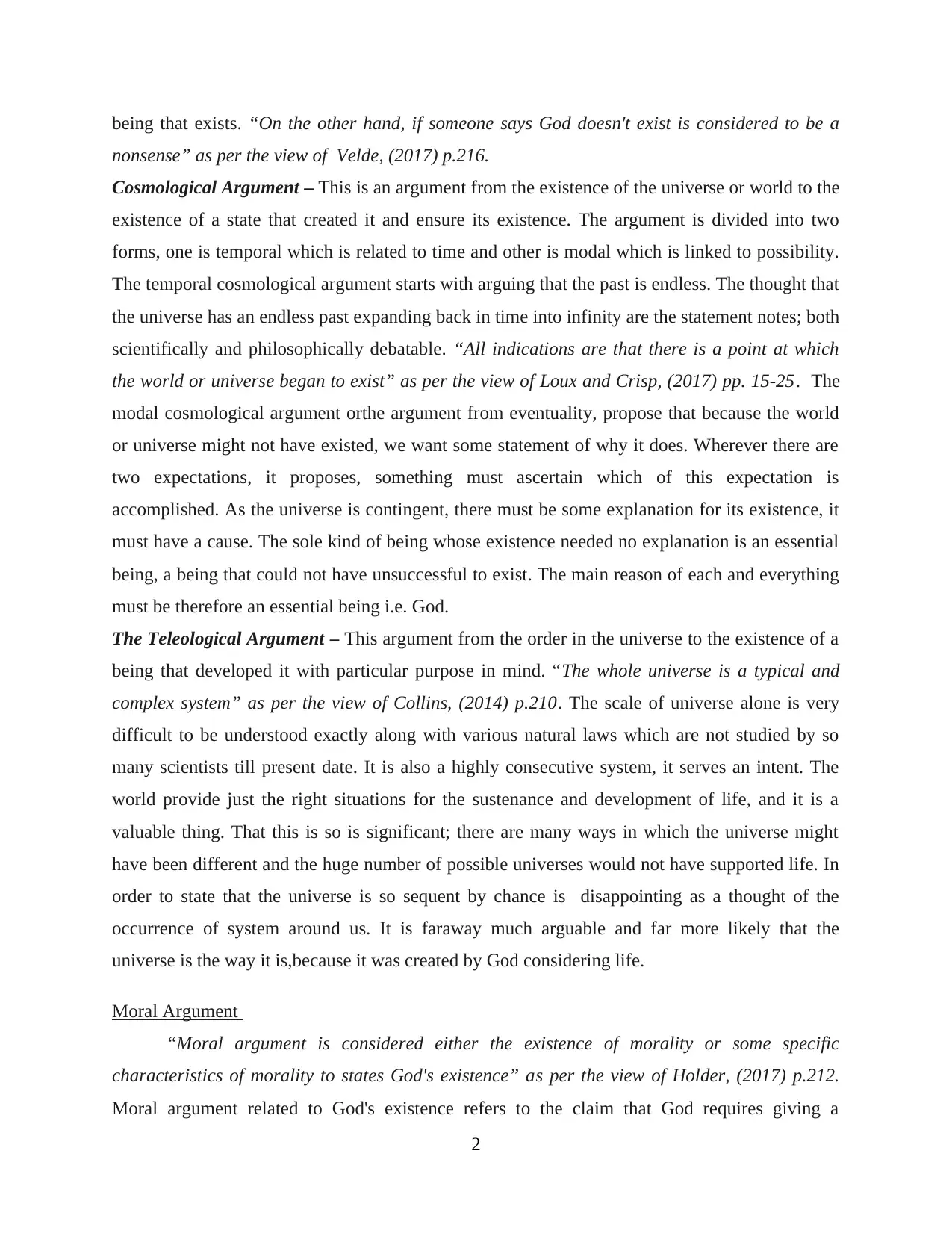
being that exists. “On the other hand, if someone says God doesn't exist is considered to be a
nonsense” as per the view of Velde, (2017) p.216.
Cosmological Argument – This is an argument from the existence of the universe or world to the
existence of a state that created it and ensure its existence. The argument is divided into two
forms, one is temporal which is related to time and other is modal which is linked to possibility.
The temporal cosmological argument starts with arguing that the past is endless. The thought that
the universe has an endless past expanding back in time into infinity are the statement notes; both
scientifically and philosophically debatable. “All indications are that there is a point at which
the world or universe began to exist” as per the view of Loux and Crisp, (2017) pp. 15-25. The
modal cosmological argument orthe argument from eventuality, propose that because the world
or universe might not have existed, we want some statement of why it does. Wherever there are
two expectations, it proposes, something must ascertain which of this expectation is
accomplished. As the universe is contingent, there must be some explanation for its existence, it
must have a cause. The sole kind of being whose existence needed no explanation is an essential
being, a being that could not have unsuccessful to exist. The main reason of each and everything
must be therefore an essential being i.e. God.
The Teleological Argument – This argument from the order in the universe to the existence of a
being that developed it with particular purpose in mind. “The whole universe is a typical and
complex system” as per the view of Collins, (2014) p.210. The scale of universe alone is very
difficult to be understood exactly along with various natural laws which are not studied by so
many scientists till present date. It is also a highly consecutive system, it serves an intent. The
world provide just the right situations for the sustenance and development of life, and it is a
valuable thing. That this is so is significant; there are many ways in which the universe might
have been different and the huge number of possible universes would not have supported life. In
order to state that the universe is so sequent by chance is disappointing as a thought of the
occurrence of system around us. It is faraway much arguable and far more likely that the
universe is the way it is,because it was created by God considering life.
Moral Argument
“Moral argument is considered either the existence of morality or some specific
characteristics of morality to states God's existence” as per the view of Holder, (2017) p.212.
Moral argument related to God's existence refers to the claim that God requires giving a
2
nonsense” as per the view of Velde, (2017) p.216.
Cosmological Argument – This is an argument from the existence of the universe or world to the
existence of a state that created it and ensure its existence. The argument is divided into two
forms, one is temporal which is related to time and other is modal which is linked to possibility.
The temporal cosmological argument starts with arguing that the past is endless. The thought that
the universe has an endless past expanding back in time into infinity are the statement notes; both
scientifically and philosophically debatable. “All indications are that there is a point at which
the world or universe began to exist” as per the view of Loux and Crisp, (2017) pp. 15-25. The
modal cosmological argument orthe argument from eventuality, propose that because the world
or universe might not have existed, we want some statement of why it does. Wherever there are
two expectations, it proposes, something must ascertain which of this expectation is
accomplished. As the universe is contingent, there must be some explanation for its existence, it
must have a cause. The sole kind of being whose existence needed no explanation is an essential
being, a being that could not have unsuccessful to exist. The main reason of each and everything
must be therefore an essential being i.e. God.
The Teleological Argument – This argument from the order in the universe to the existence of a
being that developed it with particular purpose in mind. “The whole universe is a typical and
complex system” as per the view of Collins, (2014) p.210. The scale of universe alone is very
difficult to be understood exactly along with various natural laws which are not studied by so
many scientists till present date. It is also a highly consecutive system, it serves an intent. The
world provide just the right situations for the sustenance and development of life, and it is a
valuable thing. That this is so is significant; there are many ways in which the universe might
have been different and the huge number of possible universes would not have supported life. In
order to state that the universe is so sequent by chance is disappointing as a thought of the
occurrence of system around us. It is faraway much arguable and far more likely that the
universe is the way it is,because it was created by God considering life.
Moral Argument
“Moral argument is considered either the existence of morality or some specific
characteristics of morality to states God's existence” as per the view of Holder, (2017) p.212.
Moral argument related to God's existence refers to the claim that God requires giving a
2
Paraphrase This Document
Need a fresh take? Get an instant paraphrase of this document with our AI Paraphraser
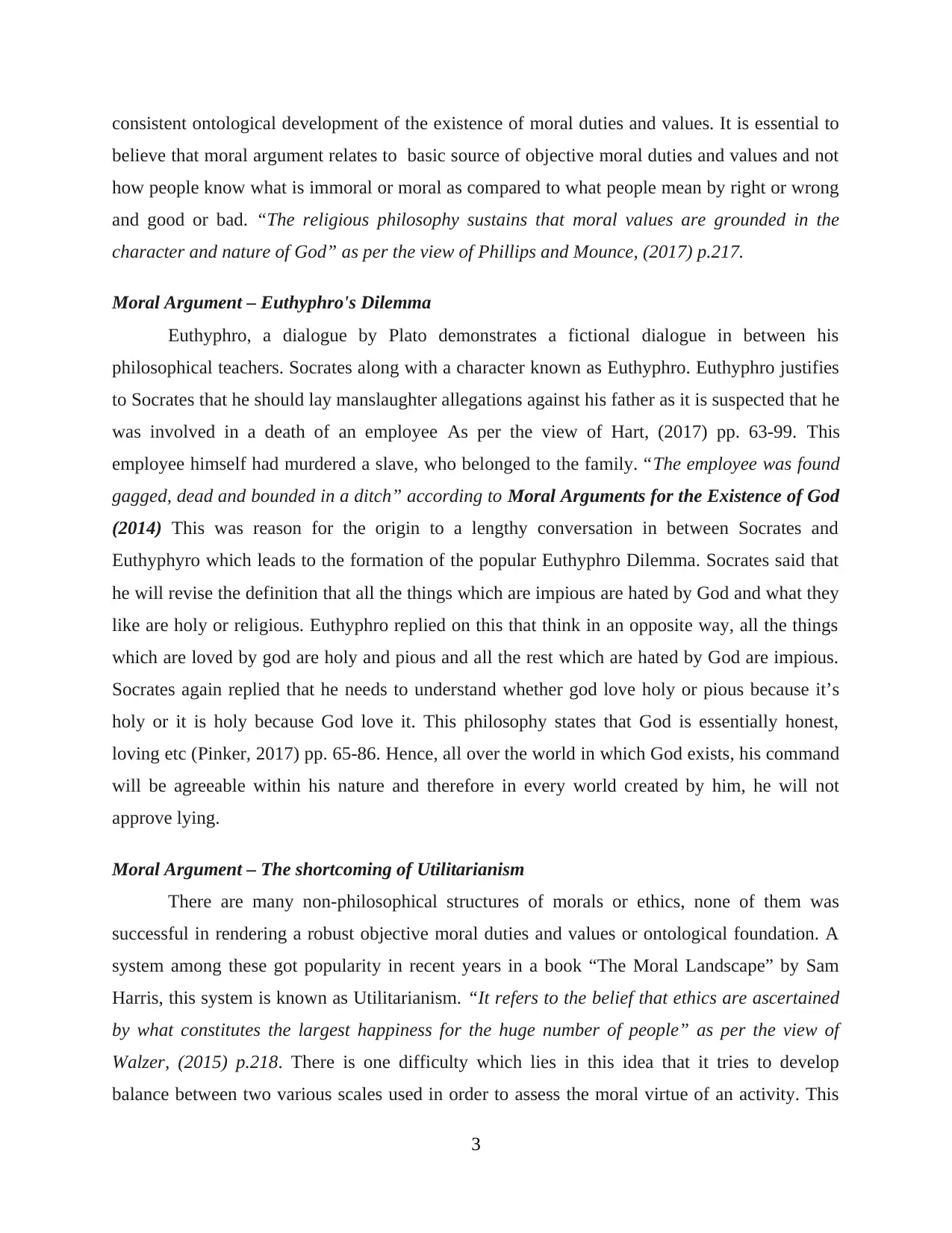
consistent ontological development of the existence of moral duties and values. It is essential to
believe that moral argument relates to basic source of objective moral duties and values and not
how people know what is immoral or moral as compared to what people mean by right or wrong
and good or bad. “The religious philosophy sustains that moral values are grounded in the
character and nature of God” as per the view of Phillips and Mounce, (2017) p.217.
Moral Argument – Euthyphro's Dilemma
Euthyphro, a dialogue by Plato demonstrates a fictional dialogue in between his
philosophical teachers. Socrates along with a character known as Euthyphro. Euthyphro justifies
to Socrates that he should lay manslaughter allegations against his father as it is suspected that he
was involved in a death of an employee As per the view of Hart, (2017) pp. 63-99. This
employee himself had murdered a slave, who belonged to the family. “The employee was found
gagged, dead and bounded in a ditch” according to Moral Arguments for the Existence of God
(2014) This was reason for the origin to a lengthy conversation in between Socrates and
Euthyphyro which leads to the formation of the popular Euthyphro Dilemma. Socrates said that
he will revise the definition that all the things which are impious are hated by God and what they
like are holy or religious. Euthyphro replied on this that think in an opposite way, all the things
which are loved by god are holy and pious and all the rest which are hated by God are impious.
Socrates again replied that he needs to understand whether god love holy or pious because it’s
holy or it is holy because God love it. This philosophy states that God is essentially honest,
loving etc (Pinker, 2017) pp. 65-86. Hence, all over the world in which God exists, his command
will be agreeable within his nature and therefore in every world created by him, he will not
approve lying.
Moral Argument – The shortcoming of Utilitarianism
There are many non-philosophical structures of morals or ethics, none of them was
successful in rendering a robust objective moral duties and values or ontological foundation. A
system among these got popularity in recent years in a book “The Moral Landscape” by Sam
Harris, this system is known as Utilitarianism. “It refers to the belief that ethics are ascertained
by what constitutes the largest happiness for the huge number of people” as per the view of
Walzer, (2015) p.218. There is one difficulty which lies in this idea that it tries to develop
balance between two various scales used in order to assess the moral virtue of an activity. This
3
believe that moral argument relates to basic source of objective moral duties and values and not
how people know what is immoral or moral as compared to what people mean by right or wrong
and good or bad. “The religious philosophy sustains that moral values are grounded in the
character and nature of God” as per the view of Phillips and Mounce, (2017) p.217.
Moral Argument – Euthyphro's Dilemma
Euthyphro, a dialogue by Plato demonstrates a fictional dialogue in between his
philosophical teachers. Socrates along with a character known as Euthyphro. Euthyphro justifies
to Socrates that he should lay manslaughter allegations against his father as it is suspected that he
was involved in a death of an employee As per the view of Hart, (2017) pp. 63-99. This
employee himself had murdered a slave, who belonged to the family. “The employee was found
gagged, dead and bounded in a ditch” according to Moral Arguments for the Existence of God
(2014) This was reason for the origin to a lengthy conversation in between Socrates and
Euthyphyro which leads to the formation of the popular Euthyphro Dilemma. Socrates said that
he will revise the definition that all the things which are impious are hated by God and what they
like are holy or religious. Euthyphro replied on this that think in an opposite way, all the things
which are loved by god are holy and pious and all the rest which are hated by God are impious.
Socrates again replied that he needs to understand whether god love holy or pious because it’s
holy or it is holy because God love it. This philosophy states that God is essentially honest,
loving etc (Pinker, 2017) pp. 65-86. Hence, all over the world in which God exists, his command
will be agreeable within his nature and therefore in every world created by him, he will not
approve lying.
Moral Argument – The shortcoming of Utilitarianism
There are many non-philosophical structures of morals or ethics, none of them was
successful in rendering a robust objective moral duties and values or ontological foundation. A
system among these got popularity in recent years in a book “The Moral Landscape” by Sam
Harris, this system is known as Utilitarianism. “It refers to the belief that ethics are ascertained
by what constitutes the largest happiness for the huge number of people” as per the view of
Walzer, (2015) p.218. There is one difficulty which lies in this idea that it tries to develop
balance between two various scales used in order to assess the moral virtue of an activity. This
3
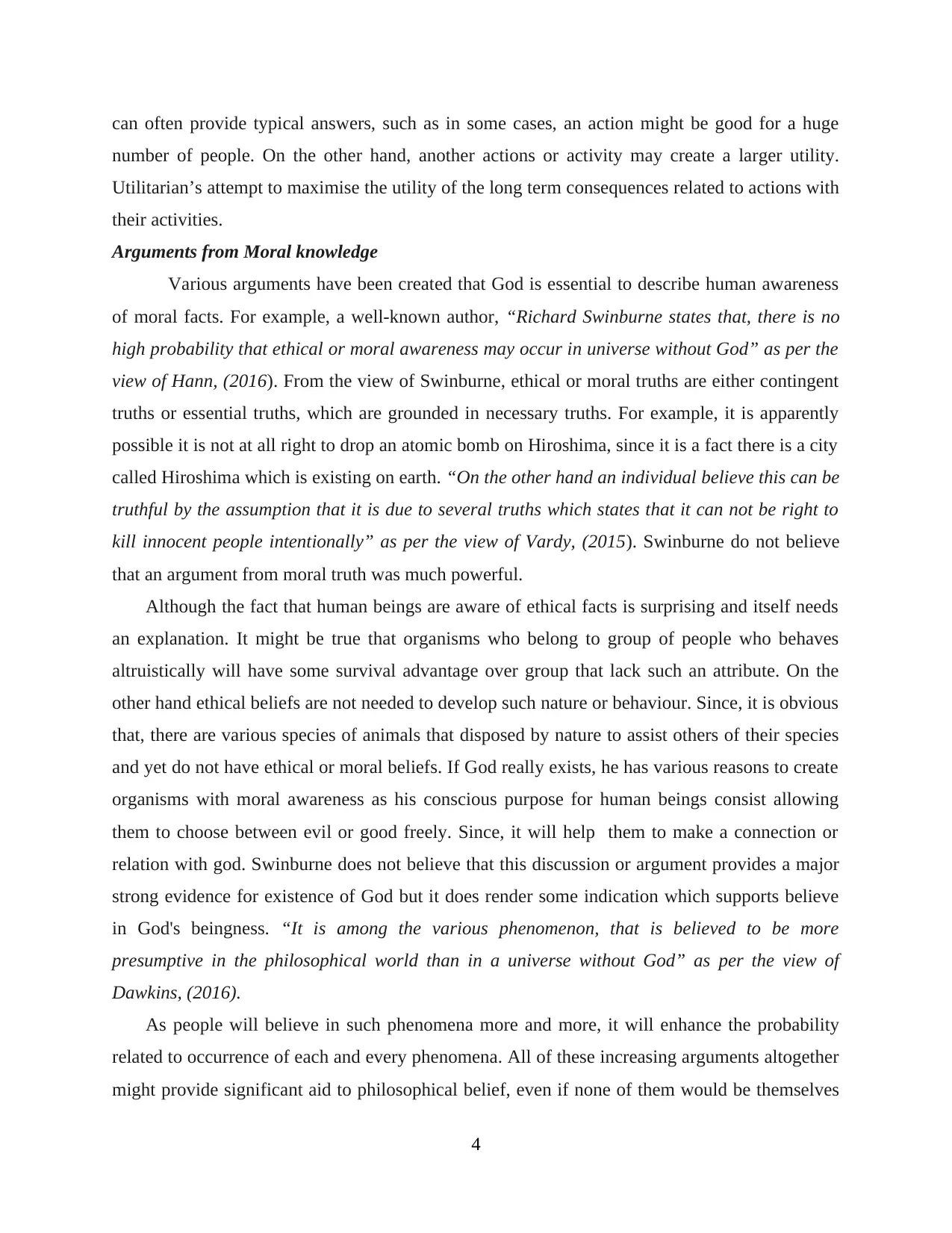
can often provide typical answers, such as in some cases, an action might be good for a huge
number of people. On the other hand, another actions or activity may create a larger utility.
Utilitarian’s attempt to maximise the utility of the long term consequences related to actions with
their activities.
Arguments from Moral knowledge
Various arguments have been created that God is essential to describe human awareness
of moral facts. For example, a well-known author, “Richard Swinburne states that, there is no
high probability that ethical or moral awareness may occur in universe without God” as per the
view of Hann, (2016). From the view of Swinburne, ethical or moral truths are either contingent
truths or essential truths, which are grounded in necessary truths. For example, it is apparently
possible it is not at all right to drop an atomic bomb on Hiroshima, since it is a fact there is a city
called Hiroshima which is existing on earth. “On the other hand an individual believe this can be
truthful by the assumption that it is due to several truths which states that it can not be right to
kill innocent people intentionally” as per the view of Vardy, (2015). Swinburne do not believe
that an argument from moral truth was much powerful.
Although the fact that human beings are aware of ethical facts is surprising and itself needs
an explanation. It might be true that organisms who belong to group of people who behaves
altruistically will have some survival advantage over group that lack such an attribute. On the
other hand ethical beliefs are not needed to develop such nature or behaviour. Since, it is obvious
that, there are various species of animals that disposed by nature to assist others of their species
and yet do not have ethical or moral beliefs. If God really exists, he has various reasons to create
organisms with moral awareness as his conscious purpose for human beings consist allowing
them to choose between evil or good freely. Since, it will help them to make a connection or
relation with god. Swinburne does not believe that this discussion or argument provides a major
strong evidence for existence of God but it does render some indication which supports believe
in God's beingness. “It is among the various phenomenon, that is believed to be more
presumptive in the philosophical world than in a universe without God” as per the view of
Dawkins, (2016).
As people will believe in such phenomena more and more, it will enhance the probability
related to occurrence of each and every phenomena. All of these increasing arguments altogether
might provide significant aid to philosophical belief, even if none of them would be themselves
4
number of people. On the other hand, another actions or activity may create a larger utility.
Utilitarian’s attempt to maximise the utility of the long term consequences related to actions with
their activities.
Arguments from Moral knowledge
Various arguments have been created that God is essential to describe human awareness
of moral facts. For example, a well-known author, “Richard Swinburne states that, there is no
high probability that ethical or moral awareness may occur in universe without God” as per the
view of Hann, (2016). From the view of Swinburne, ethical or moral truths are either contingent
truths or essential truths, which are grounded in necessary truths. For example, it is apparently
possible it is not at all right to drop an atomic bomb on Hiroshima, since it is a fact there is a city
called Hiroshima which is existing on earth. “On the other hand an individual believe this can be
truthful by the assumption that it is due to several truths which states that it can not be right to
kill innocent people intentionally” as per the view of Vardy, (2015). Swinburne do not believe
that an argument from moral truth was much powerful.
Although the fact that human beings are aware of ethical facts is surprising and itself needs
an explanation. It might be true that organisms who belong to group of people who behaves
altruistically will have some survival advantage over group that lack such an attribute. On the
other hand ethical beliefs are not needed to develop such nature or behaviour. Since, it is obvious
that, there are various species of animals that disposed by nature to assist others of their species
and yet do not have ethical or moral beliefs. If God really exists, he has various reasons to create
organisms with moral awareness as his conscious purpose for human beings consist allowing
them to choose between evil or good freely. Since, it will help them to make a connection or
relation with god. Swinburne does not believe that this discussion or argument provides a major
strong evidence for existence of God but it does render some indication which supports believe
in God's beingness. “It is among the various phenomenon, that is believed to be more
presumptive in the philosophical world than in a universe without God” as per the view of
Dawkins, (2016).
As people will believe in such phenomena more and more, it will enhance the probability
related to occurrence of each and every phenomena. All of these increasing arguments altogether
might provide significant aid to philosophical belief, even if none of them would be themselves
4
⊘ This is a preview!⊘
Do you want full access?
Subscribe today to unlock all pages.

Trusted by 1+ million students worldwide
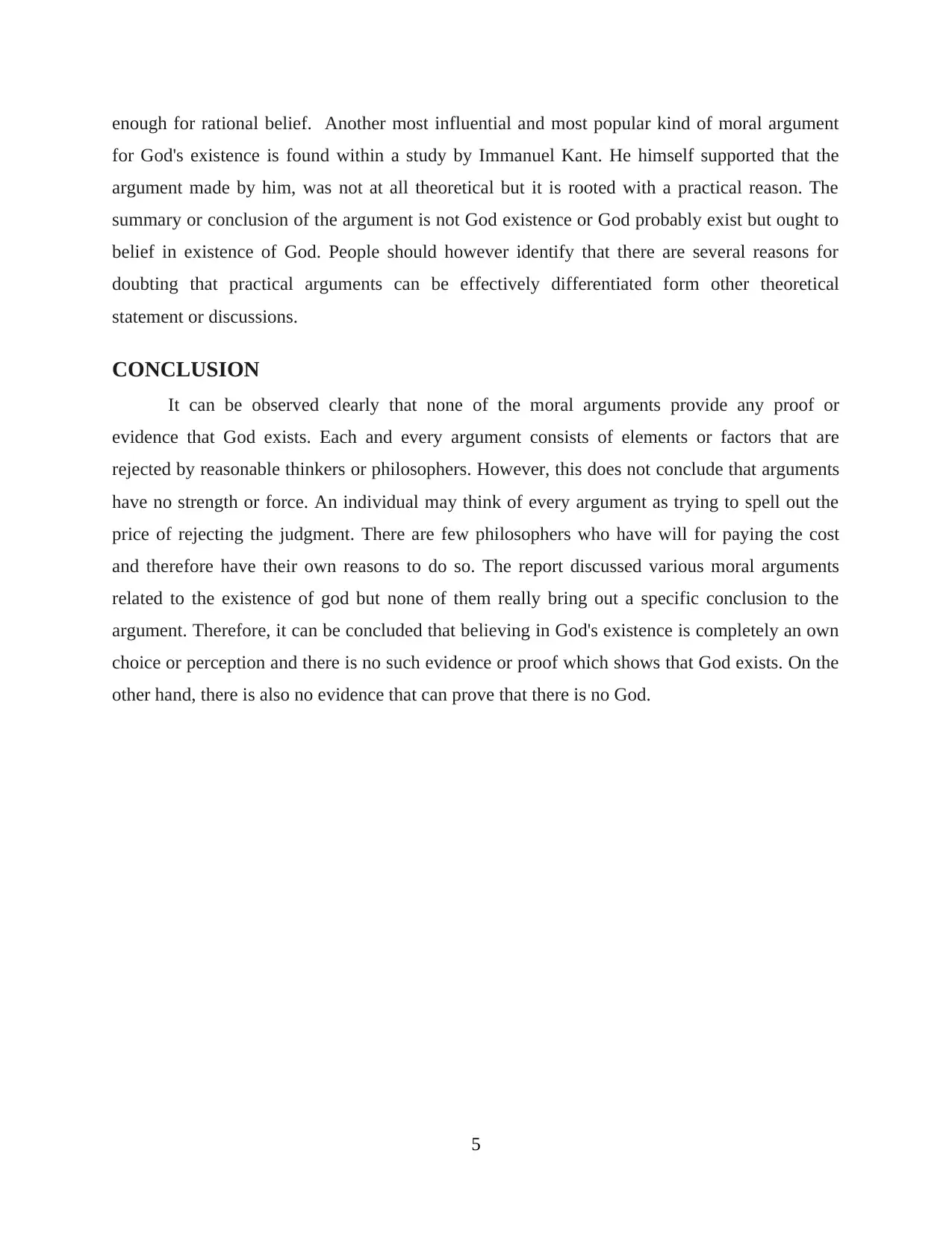
enough for rational belief. Another most influential and most popular kind of moral argument
for God's existence is found within a study by Immanuel Kant. He himself supported that the
argument made by him, was not at all theoretical but it is rooted with a practical reason. The
summary or conclusion of the argument is not God existence or God probably exist but ought to
belief in existence of God. People should however identify that there are several reasons for
doubting that practical arguments can be effectively differentiated form other theoretical
statement or discussions.
CONCLUSION
It can be observed clearly that none of the moral arguments provide any proof or
evidence that God exists. Each and every argument consists of elements or factors that are
rejected by reasonable thinkers or philosophers. However, this does not conclude that arguments
have no strength or force. An individual may think of every argument as trying to spell out the
price of rejecting the judgment. There are few philosophers who have will for paying the cost
and therefore have their own reasons to do so. The report discussed various moral arguments
related to the existence of god but none of them really bring out a specific conclusion to the
argument. Therefore, it can be concluded that believing in God's existence is completely an own
choice or perception and there is no such evidence or proof which shows that God exists. On the
other hand, there is also no evidence that can prove that there is no God.
5
for God's existence is found within a study by Immanuel Kant. He himself supported that the
argument made by him, was not at all theoretical but it is rooted with a practical reason. The
summary or conclusion of the argument is not God existence or God probably exist but ought to
belief in existence of God. People should however identify that there are several reasons for
doubting that practical arguments can be effectively differentiated form other theoretical
statement or discussions.
CONCLUSION
It can be observed clearly that none of the moral arguments provide any proof or
evidence that God exists. Each and every argument consists of elements or factors that are
rejected by reasonable thinkers or philosophers. However, this does not conclude that arguments
have no strength or force. An individual may think of every argument as trying to spell out the
price of rejecting the judgment. There are few philosophers who have will for paying the cost
and therefore have their own reasons to do so. The report discussed various moral arguments
related to the existence of god but none of them really bring out a specific conclusion to the
argument. Therefore, it can be concluded that believing in God's existence is completely an own
choice or perception and there is no such evidence or proof which shows that God exists. On the
other hand, there is also no evidence that can prove that there is no God.
5
Paraphrase This Document
Need a fresh take? Get an instant paraphrase of this document with our AI Paraphraser
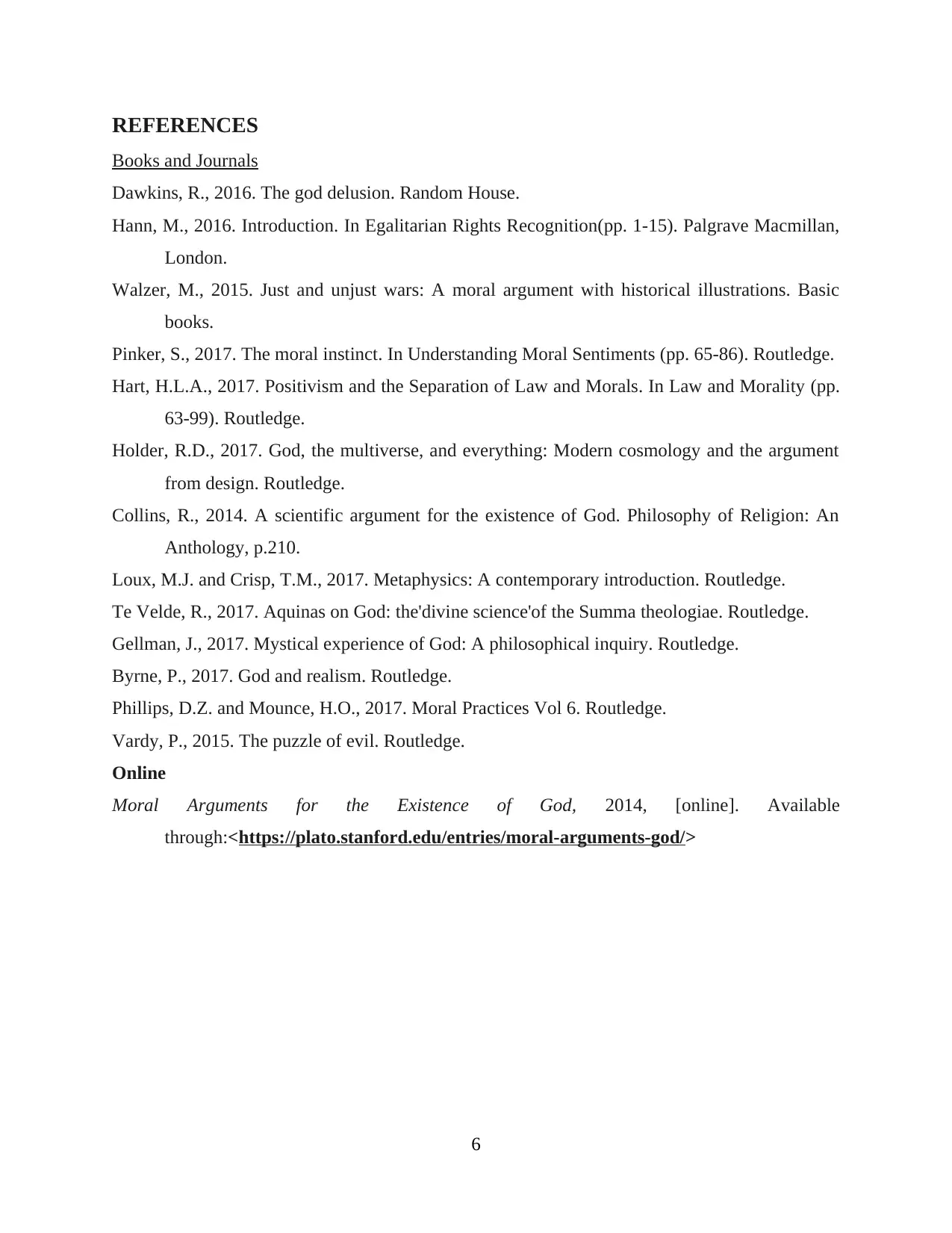
REFERENCES
Books and Journals
Dawkins, R., 2016. The god delusion. Random House.
Hann, M., 2016. Introduction. In Egalitarian Rights Recognition(pp. 1-15). Palgrave Macmillan,
London.
Walzer, M., 2015. Just and unjust wars: A moral argument with historical illustrations. Basic
books.
Pinker, S., 2017. The moral instinct. In Understanding Moral Sentiments (pp. 65-86). Routledge.
Hart, H.L.A., 2017. Positivism and the Separation of Law and Morals. In Law and Morality (pp.
63-99). Routledge.
Holder, R.D., 2017. God, the multiverse, and everything: Modern cosmology and the argument
from design. Routledge.
Collins, R., 2014. A scientific argument for the existence of God. Philosophy of Religion: An
Anthology, p.210.
Loux, M.J. and Crisp, T.M., 2017. Metaphysics: A contemporary introduction. Routledge.
Te Velde, R., 2017. Aquinas on God: the'divine science'of the Summa theologiae. Routledge.
Gellman, J., 2017. Mystical experience of God: A philosophical inquiry. Routledge.
Byrne, P., 2017. God and realism. Routledge.
Phillips, D.Z. and Mounce, H.O., 2017. Moral Practices Vol 6. Routledge.
Vardy, P., 2015. The puzzle of evil. Routledge.
Online
Moral Arguments for the Existence of God, 2014, [online]. Available
through:<https://plato.stanford.edu/entries/moral-arguments-god/>
6
Books and Journals
Dawkins, R., 2016. The god delusion. Random House.
Hann, M., 2016. Introduction. In Egalitarian Rights Recognition(pp. 1-15). Palgrave Macmillan,
London.
Walzer, M., 2015. Just and unjust wars: A moral argument with historical illustrations. Basic
books.
Pinker, S., 2017. The moral instinct. In Understanding Moral Sentiments (pp. 65-86). Routledge.
Hart, H.L.A., 2017. Positivism and the Separation of Law and Morals. In Law and Morality (pp.
63-99). Routledge.
Holder, R.D., 2017. God, the multiverse, and everything: Modern cosmology and the argument
from design. Routledge.
Collins, R., 2014. A scientific argument for the existence of God. Philosophy of Religion: An
Anthology, p.210.
Loux, M.J. and Crisp, T.M., 2017. Metaphysics: A contemporary introduction. Routledge.
Te Velde, R., 2017. Aquinas on God: the'divine science'of the Summa theologiae. Routledge.
Gellman, J., 2017. Mystical experience of God: A philosophical inquiry. Routledge.
Byrne, P., 2017. God and realism. Routledge.
Phillips, D.Z. and Mounce, H.O., 2017. Moral Practices Vol 6. Routledge.
Vardy, P., 2015. The puzzle of evil. Routledge.
Online
Moral Arguments for the Existence of God, 2014, [online]. Available
through:<https://plato.stanford.edu/entries/moral-arguments-god/>
6
1 out of 8
Related Documents
Your All-in-One AI-Powered Toolkit for Academic Success.
+13062052269
info@desklib.com
Available 24*7 on WhatsApp / Email
![[object Object]](/_next/static/media/star-bottom.7253800d.svg)
Unlock your academic potential
Copyright © 2020–2026 A2Z Services. All Rights Reserved. Developed and managed by ZUCOL.





